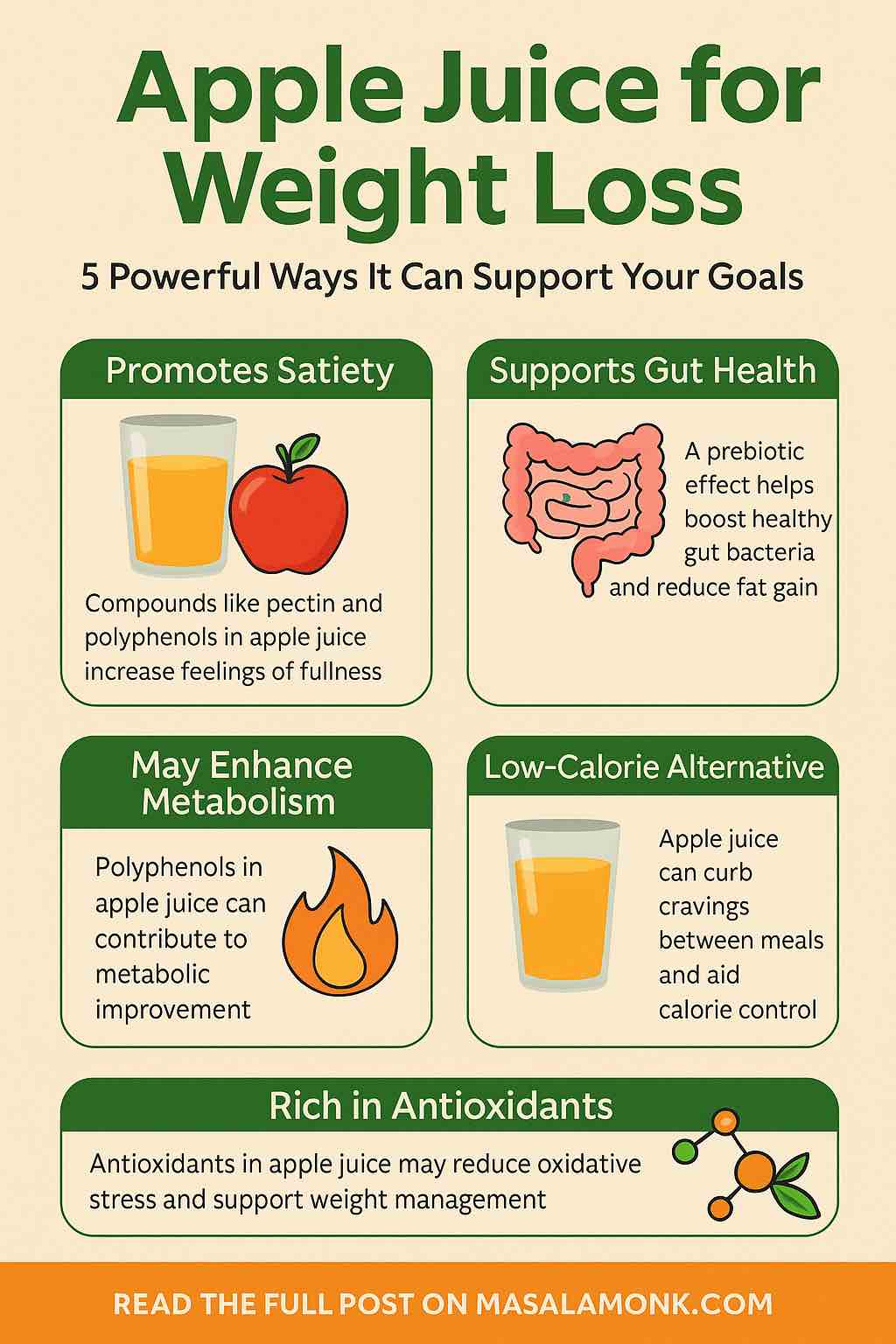
Apple juice isn’t usually the first thing that comes to mind when we talk about weight loss. More often than not, it’s the villain in conversations about sugar and empty calories. But is that the full story? Recent studies and a closer look at how apple juice interacts with our gut, metabolism, and cravings suggest there may be more to this fruit-based beverage than meets the eye. In this article, we explore five science-backed ways apple juice can support your weight loss journey—when used smartly.
1. Boosts Gut Health with Prebiotic Properties
Recent animal studies have revealed that unfiltered apple juice, especially from varieties like Fuji and Tsugaru, can dramatically alter the gut microbiota. In rats fed a high-fat diet, daily apple juice consumption led to:
- A 3x increase in Lactobacillus species
- A 10x increase in Bifidobacterium
- Lower weight gain
- Reduced fat accumulation in the liver
Why does this matter? A diverse and balanced gut microbiome has been directly linked to better weight regulation, improved digestion, and decreased inflammation. While human trials are still limited, this research is promising and suggests apple juice may help create a gut environment conducive to weight control.
Practical Tip: Choose cloudy or unfiltered apple juice—it retains more of the polyphenols and pectin that fuel gut-friendly bacteria.
2. Curbs Cravings and Can Be a Smart Snack Substitute
While apple juice lacks the fiber found in whole apples, it can still be a useful mid-meal snack if chosen wisely. A standard 240 mL (1 cup) serving contains roughly 114 calories—far fewer than many processed snack foods.
When consumed in moderation and paired with a protein or fat source, it may help stabilize blood sugar and prevent binge eating.
Practical Tip: Drink a small glass of apple juice with a boiled egg or a handful of almonds to stave off cravings between meals.
3. Contains Polyphenols That Enhance Metabolism
Apple juice is rich in antioxidants and polyphenols, such as quercetin and chlorogenic acid, which have been shown to:
- Improve lipid metabolism
- Increase fat oxidation
- Reduce oxidative stress (which contributes to obesity)
Though whole apples contain more of these compounds—especially in the skin—cloudy apple juice still delivers a meaningful dose.
Practical Tip: Look for juices labeled “cloudy” or “not from concentrate.” These typically contain more polyphenols than clear, filtered juices.
4. Supports Heart Health and Inflammation Control
Weight loss isn’t just about shedding pounds—it’s about improving overall health. Apple juice has been linked in several studies to reduced markers of inflammation and improved cardiovascular health, both of which are often compromised in people struggling with obesity.
Lowering systemic inflammation may also improve insulin sensitivity and metabolic efficiency, making weight loss easier over time.
Practical Tip: Incorporate apple juice as part of a broader anti-inflammatory diet, rich in vegetables, whole grains, fatty fish, and healthy fats.
5. Encourages Better Hydration with Flavor Variety
Hydration plays a critical role in metabolism and appetite regulation. Sometimes, what feels like hunger is actually thirst. Apple juice can offer a flavorful alternative to plain water and can be particularly effective if you dislike drinking plain fluids.
Just don’t overdo it: excessive consumption can backfire due to the natural sugars. A small glass, especially when diluted with water or sparkling water, can be a refreshing way to stay hydrated.
Practical Tip: Mix 50% apple juice with 50% water or soda water for a light, hydrating drink with fewer calories and sugar.
A Word of Caution: Juice Isn’t a Magic Bullet
While the benefits of apple juice are intriguing, it’s important to keep things in perspective:
- It lacks the fiber and chewing resistance of whole fruit, which are important for satiety.
- Overconsumption can lead to excess calorie intake.
- It may spike blood sugar in some individuals, especially those with insulin resistance.
Better Together: Use apple juice as a complement to, not a replacement for, a balanced, whole-food diet.
Conclusion: A Strategic Ally, Not a Shortcut
Apple juice can absolutely be part of a smart weight loss strategy—but only when used with intention. By choosing the right type (cloudy, no added sugar), keeping portions modest, and pairing it with protein or fiber-rich foods, you can tap into its gut-supportive, metabolism-enhancing, and craving-busting benefits.
As always, real results come from the sum of your habits. Let apple juice play a helpful, flavorful role in a sustainable approach to wellness.
Have you tried including apple juice in your weight loss journey? Share your experience below or ask questions—we’d love to hear from you!
✅ 10 FAQs about Apple Juice and Weight Loss
1. Can I drink apple juice every day and still lose weight?
Yes, but moderation is key. Stick to about 240 mL (1 cup) per day, preferably cloudy, no-added-sugar apple juice. Make sure it fits within your overall calorie goals.
2. What kind of apple juice is best for weight loss?
Choose cloudy or unfiltered apple juice. It contains more polyphenols and pectin, which support gut health and metabolism better than clear, filtered versions.
3. Is apple juice better than whole apples for weight loss?
No—whole apples are superior due to their fiber and satiety benefits. Juice can complement your diet but shouldn’t replace whole fruit.
4. Will apple juice raise my blood sugar levels?
It can, especially if consumed in large quantities or without balancing nutrients. Pairing it with protein or fat (like nuts or yogurt) can reduce the blood sugar spike.
5. Can I drink apple juice on an empty stomach in the morning?
You can, but for better energy and blood sugar stability, pair it with a protein- or fiber-rich food. This helps avoid insulin spikes and early hunger pangs.
6. What are some healthy ways to include apple juice in my diet?
- Mix with sparkling water for a low-calorie beverage
- Use in smoothies as a natural sweetener
- Pair with boiled eggs or a small portion of nuts
- Add to marinades or vinaigrettes
7. How does apple juice support gut health?
Unfiltered apple juice contains prebiotic compounds like pectin and polyphenols, which nourish beneficial gut bacteria linked to better weight management.
8. Are there any risks of drinking apple juice for weight loss?
Yes—overconsumption can lead to excess sugar and calories, potentially hindering weight loss. It may also affect dental health if consumed frequently without rinsing.
9. Is there a best time of day to drink apple juice for weight loss?
Mid-morning or mid-afternoon, between meals, is ideal. It can curb cravings and give a gentle energy boost without interfering with your main meals.
10. Can kids or people with diabetes use apple juice for weight control?
Kids should consume juice sparingly. People with diabetes should consult a doctor or dietitian before adding juice, as it can impact blood glucose levels.













